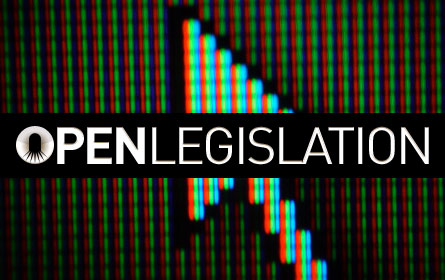
After remaining on the sidelines for years, government now seems eager to keep up with the ever evolving world of technology and new media and even to advance it. Earlier this month, the New York State Senate continued with this trend, launching an Open Legislation website intended to make it easier for New Yorkers to find out about bills and comment on them.
Transparency initiatives should seem familiar to city residents. Since taking office as mayor in 2002, Michael Bloomberg has attempted use technology to achieve more transparency. While some of these efforts have been more successful than others, they have led to the creation of 311, a phone and internet hotline for government information, and to the city's offering an array of statistics on nyc.gov. The City Council has made the text of bills available through a keyword search on its website, as has the State Assembly. Unlike the State Senate's new program, though, these do not provide a place for people to leave comments.
Sen. Jose Serrano, who launched the site in front of students at Manhattan Center for Science and Mathematics, believes that growing disclosure of the actions of the State Senate will increase citizen participation and make representatives more accountable, while also encouraging young people to get involved.
"Albany has been shrouded in mystery for so long to the point where the disconnect between the Albany legislature and the average person is beyond apathy," Serrano said. "I think this is a good initial step at creating a vested feeling for folks who are trying to access information."
Easier Access and Participation
The site, which debuted on Nov. 5, provides the full text of bills as well as the memo summarizing the legislation and offering the reasons for it. In this way it effectively allows those outside of Albany access to information that used to be available only to insiders.
The site does not seek to simply provide access but also tries to make it easy. Previously, doing a search required knowing the bill number.
Now, though, Open Legislation includes a Google-like search mechanism allows users to find bills by typing in a keyword. They can, for instance, search anything from "crime" to "school nutrition" and have all relevant bills appear on the results page. Performing a search on a broad keyword issue like "zoning elicits over 30 responses. For now (there are plans to possibly rework this), the results appear by bill number, rather than some other sort of distinction such as date. Visitors can view the bill in HTML, XML, CSV, or JSON format. The page for the legislation includes sections for a summary, action on it, the memo and its full text, topped off with the comments section at the bottom.
Visitors also can conduct searches by sponsor, committee, recent action or recent votes.
"We tried to build a very simple, easy to use search interface that we think will be useful to a lot of people," explains Andrew Hoppin, chief information officer for the Senate, who helped create the site with lead developer Nathan Freitas.
Those involved with the site seem most excited about the comments section. Serrano believes it will have a positive effect on future legislation.
"Traditionally, you had to go lobby physically in Albany, or you had to write memos of supporter opposition or be invited to go testify at a meeting," he said. Now, he continued, "We're trying to get the community engaged in a way that it hasn't been before. I want people to say, 'That's a great job Serrano,' or, 'No, you're totally off-base on this one, Serrano, and here's why.'"
He believes fellow senators will be receptive to their constituents' suggestions. "If elected officials have learned anything over the last year or so, it's that the public's voice needs to be heard and it needs to be heard in a meaningful way. When you partner with the public on legislation, you actually create a much better product," Serrano said.
Reaching Out to Youth
Serrano held the launch at the East Harlem high school not only because it is located in his district, but also because he hopes it will encourage young people, who tend to be technically savvy, to get involved in government.
After giving a brief explanation of the process of law making, Serrano invited the students to conduct their own searches. Some looked into education while others delved housing related bills.
"They live in apartments that may or may not be there for them in the coming future," the senator said, noting one student investigated vacancy decontrol. "Knowing that there's a bill that will protect affordable housing, they may want to get behind that."
Moving Forward
The website will remain in its beta form until it has been "battle tested by thousands of people using it for a number of months," said Hoppin.
And, while this may be the largest project aimed at transparency from the state in a while Hoppin said it will not be the last. A major overhaul of committee websites within nysenate.gov is also in the works. The goal is to better disclose information about committee meetings and hearing, while also providing live streaming video.
Serrano is working on launching a channel for the State Senate similar to CSPAN, where meetings would be broadcast live. He previously broadcast a committee meeting on YouTube and received what he felt were meaningful responses.




